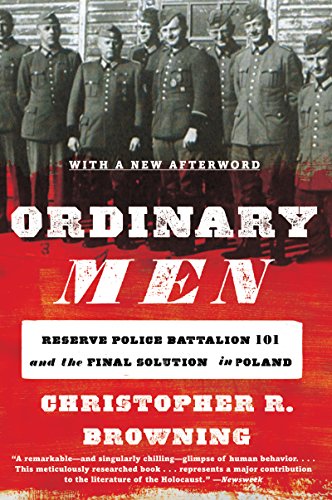Ordinary Men
Reserve Police Battalion 101 and the Final Solution in Poland
Christopher R. Browning
BOOK REVIEW

In Ordinary Men: Reserve Police Battalion 101 and the Final Solution in Poland, Christopher R. Browning unveils a haunting exploration of the banality of evil-a stark reminder that the architects of unimaginable atrocities can emerge from the most unremarkable of backgrounds. This meticulously researched work exposes a chilling truth: ordinary individuals, when swept up in a tide of ideology and desensitized to violence, are capable of committing heinous acts.
Set against the backdrop of World War II, Browning recounts the grim chronicles of the Reserve Police Battalion 101, a group of middle-aged men, many of whom were simply looking to provide for their families amidst the chaos. Yet, as they were thrust into the brutal machinery of the Holocaust, they transformed from mundane citizens into agents of horror. This metamorphosis poses the disconcerting question: how could such a transformation happen? Browning's examination ignites a firestorm of reflection within you; it forces you to confront uncomfortable truths about human nature and societal complicity.
As you immerse yourself in this narrative, your heart races and your mind grapples with the complexities of morality and accountability. This investigation transcends mere historical recounting; it's a brutal confrontation with the dark recesses of humanity. How could these men, perhaps just like your neighbors or colleagues, become willing participants in genocide? Browning challenges you to peel away layers of defense mechanisms and biases, forcing a reckoning that some may wish to avoid.
Readers have reacted with a swirl of emotions to Browning's account. Some applaud his gripping narrative and exhaustive research-highlighting his ability to bring to life the chilling details of the situation while also illuminating the psychological landscape that allowed such monstrosities to occur. Others, however, criticize the work for its unflinching portrayal of ordinary individuals as complicit agents in genocide. This lack of romanticism and moral covering leaves many feeling uncomfortable, yet it is precisely this discomfort that instills the book with its power.
✊️ One of the core contributions of Browning's work is its ability to evoke empathy for the victims while simultaneously offering a disturbing glimpse into the minds of the perpetrators. Browning illustrates that the men of Battalion 101 were not evil incarnate; they were human beings who succumbed to peer pressure, sought camaraderie, and often rationalized their actions under the guise of duty. This is both chilling and sobering.
Moreover, the implications of this narrative ripple through history, influencing countless discussions about authoritarianism, conformity, and the depths of human depravity. Scholars, educators, and activists alike frequently reference Browning's findings as a fundamental text in unraveling the often-ignored complexities of human behavior in times of crisis.
The broader spectrum of historical moments echoes these themes-think of the atrocities in Cambodia, Rwanda, and Bosnia, where ordinary people were mobilized to commit unspeakable acts against their neighbors. Ordinary Men serves as a stark warning that under specific conditions, anyone can be drawn into the horrors of tyranny and violence.
Yet, there's something profoundly hopeful buried within these harrowing tales: the possibility of awareness. Browning ignites in you a spark of vigilance-an insistent reminder that learning from the past is crucial in preventing history from repeating itself. By confronting these uncomfortable truths about human nature, you arm yourself against complacency, ensuring that such atrocities remain a specter of history, rather than a potential future.
In summary, Ordinary Men is not just a historical account; it is a clarion call that resonates through the ages. It urges you to reflect on your own moral compass and the societal structures around you. Browning's meticulous examination challenges you to consider: What would you do? Would you, too, slip into the shadows of complicity, or would you stand firm against the tide? Each page compels you to wrestle with these questions, igniting a blend of dread and determination that lingers long after the last word is read. 💔
📖 Ordinary Men: Reserve Police Battalion 101 and the Final Solution in Poland
✍ by Christopher R. Browning
🧾 384 pages
2017
#ordinary #men #reserve #police #battalion #final #solution #poland #christopher #browning #ChristopherRBrowning